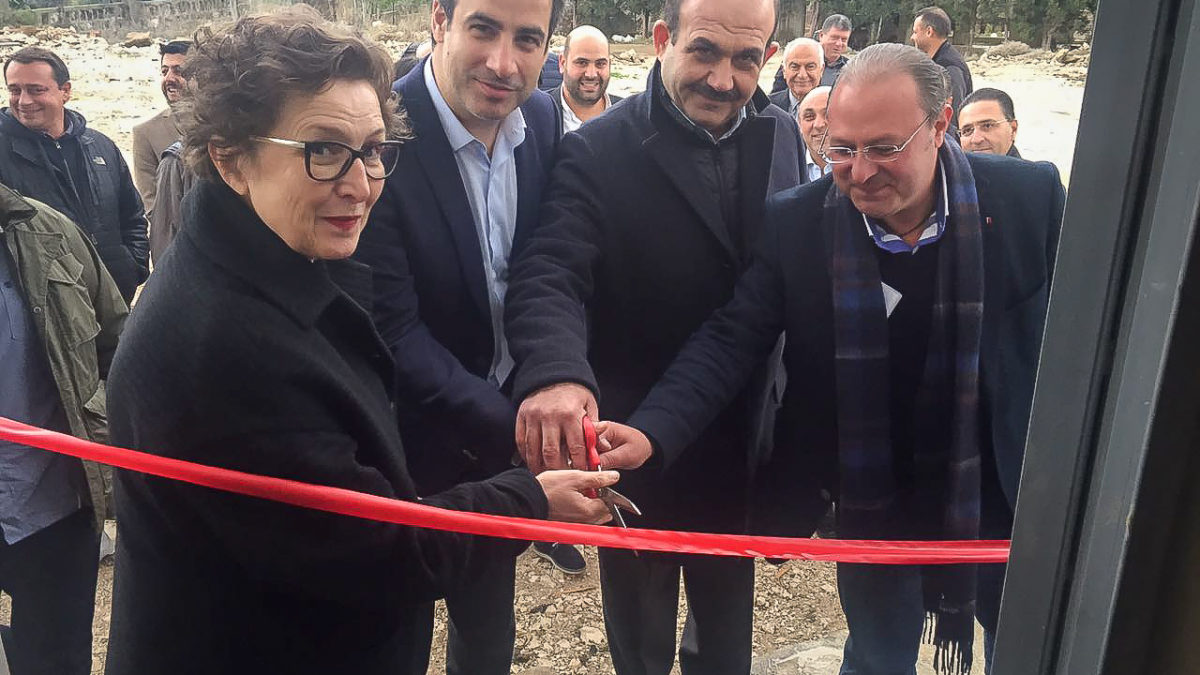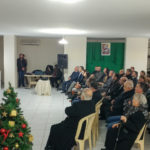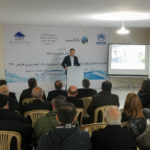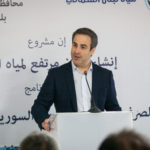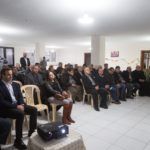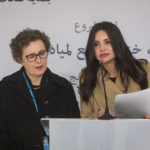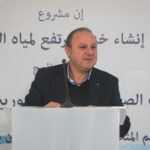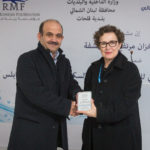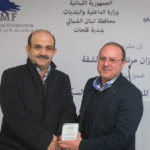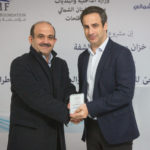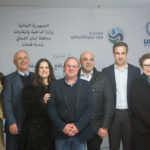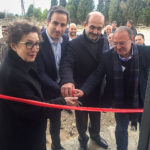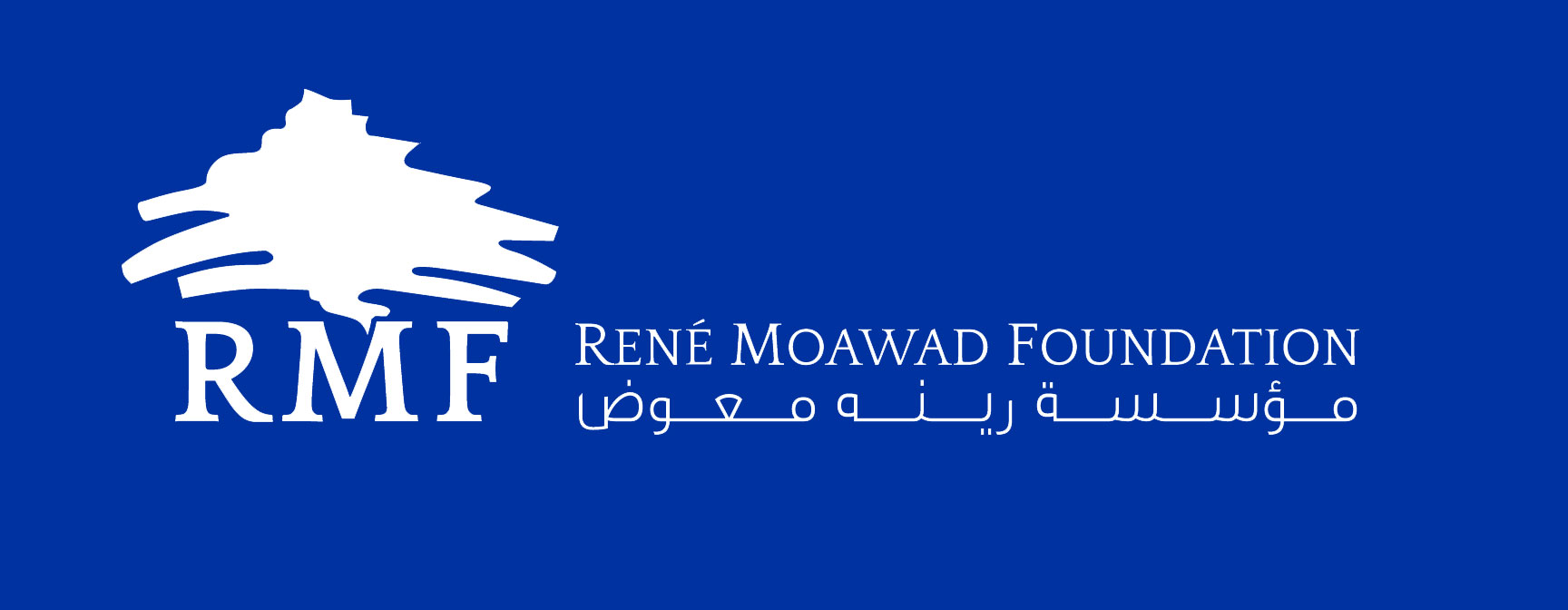The reservoir has a 324,000 liter capacity to serve 4,000 people, including 1,000 Syrian refugees.
RMF launched the “Establishing of an elevated reservoir for drinking water in Qalhat, Koura” project, in Qalhat, in partnership with the UNHCR (United Nations High Commissioner for Refugees) and in cooperation with the North Lebanon Water Establishment (NLWE) and the Municipality of Qalhat- Koura. The project is part of the “WASH assistance for Syrians refugees and affected population in Tripoli (T5), North Lebanon” Program.
The event took place at the St. George Hall, in Qalhat.
The project’s goal is to expand Qalhat’s water reservoir managed by the North Lebanon Water Establishment, in order to offer to the inhabitants from Qalhat, and the Syrian refugees the ability to benefit from this reservoir.
Present at the event were: Mrs Itta Schuette the head of the UNCHR North Lebanon sub office, representing the head of the UNCHR Commission; RMF’s Executive Director Michel Moawad; the president of the Union of Municipalities in Koura, Engineer Karim Abou Karim; the Qaemakam of Koura, Catherine Kfoury Angol; the mayor of Qalhat Dr. Bakhos Wehbe; in addition to mayors for the Koura region, representatives of political, social, cultural and educational instances, and a crowd of local citizens.
The event started with the national anthem followed by a welcoming speech from the event presenter Chantal Shehadeh. The first speaker was the mayor of Qalhat Dr. Bakhos Wehbe, who spoke about the importance of the project and the needs it is fulfilling. “On this occasion, he said, I first wish for our Syrians brothers to be able to return to their homeland without delays, and in a decent and honorable manner. This is not said with any feeling of burden for their presence here, but out of love.”
He concluded by hoping that “the project will be taken over by the North Lebanon Water Establishment, who will oversee its proper implementation and maintenance in the future.”
Mrs Itta Schuette then delivered UNCHR’s address, after sharing her personal appreciation for the project. In the address she explained the UNCHR’s dedication to support governments by meeting the needs and protecting the rights of the people who are forced to flee their countries.
She added: “It is recognized worldwide that Lebanon is bearing a heavy burden in receiving Syrian refugees. On behalf of the UNCHR Commission, I wish to express my high appreciation for the support of refugees in Lebanon. We know well that all the municipalities are affected by this presence, including the municipality of Qalhat. Therefore, the Commission is very committed to providing the needed funds for this water project, which will benefit all the community here in Qalhat. At its initial stages, the project was presented to us by the North Lebanon Water Establishment as a project that would improve the living conditions of the people living in Qalhat.”
And she continued: “With the new reservoir, more water will be stored which will increase the water pressure and power. The existing users will get enough water to meet their needs, as will the new users who will be joining the network later. It is estimated that 4,000 people at the least will benefit from this project.”
She concluded thanking all the partners in the project: “I am aware that the construction of the water tank is just one step on a long path which we will walk together. We hope that this project will continue so that this initiative turns successful. We are confident that the municipality will take all the necessary measures for this: maintenance, networks and subscriptions, so that the project proves to be successful on the long term.”
Nasr
Mr Gaby Nasr, representing the director general of the North Lebanon Water Establishment, spoke next, presenting an overview of Qalhat’s history and its conditions. He revealed that “It was due to the insistence of the North Lebanon Water Establishment (NLWE) on the importance of Sustainable Development that Qalhat got this significant support. The NLWE believed that this town deserved all possible backing. The UNHCR paid special attention to the water sector in Lebanon considering its direct impact on people’s lives.”
Nasr concluded by thanking the UNCHR for the assistance that it is providing to the North Lebanon Water Establishment. He extended his thanks to the Rene Moawad Foundation (the director and the implementing managers), the Municipality of Qalhat and ‘Karamco’ the implementation contractor. He shared his hope to complete the implementation of all the water projects planned for, in coordination with the responsible authorities.
Moawad
In the concluding speech, RMF’s Executive Director Michel Moawad said: “I am very happy today that we are implementing this project in Koura. The Rene Moawad Foundation has been implementing projects in all the parts of Lebanon from the far North to the far South. The Foundation would for sure not forget the Koura region which was very dear to President Rene Moawad and to us. We recently implemented a project in Kousba, and today here we are in Qalhat.
“Where there is no water, there is no life. It is unfortunate, but we have reached a state in Lebanon where negligence is not anymore present in some places, but has spread to all of Lebanon’s regions, confessions and areas.
“Today we celebrate this water project, and we hope that by God’s grace, the skies will be generous with rains and gifts. It will be a pity if we don’t fully benefit from all this water. Just imagine how much water goes waste, how much water goes into the sea without any benefit for us, how much water washes away the soil without us benefiting from it, and how many areas, villages and towns in Lebanon are lacking water…
“In the country of water, the water goes waste! What is lacking to properly benefit from it? Certainly not the lack of knowledge. What we lack is a clear decision and less corruption. We ought to move closer toward decentralization. This way, each region will find its ways to deal with its own needs. The local authorities would for sure know more than any other authority, the needs of their area. If they are given the proper means and powers, they will be able to bring the appropriate development to their regions, in coordination with the local civil society and social institutions. In all the countries of the world, development is the responsibility of local authorities not of the central authority.
“Today, with the joint efforts of the municipality of Qalhat and the Rene Moawad Foundation, in coordination with the North Lebanon Water Establishment, and with the funding of the UNHCR, we were able to build a reservoir with a capacity of 324 thousand liters, and to insure water for about 4,000 people: 3,000 of them Lebanese citizens living in Qalhat and 1,000 Syrian refugees staying today in Qalhat. In the light of all the suffering caused by the war in Syria, which led to the exodus of the Syrian people which we unfortunately didn’t succeed in dealing with properly in Lebanon, the Lebanese people became a part of this suffering.
“The project that we are launching today is part of the work done by the Rene Moawad Foundation to achieve its mission of standing by and supporting the people of Lebanon in spite of all the difficulties, and to help preserve our Lebanese Identity, so that the ‘Lebanese individual stays in his land’.
“Today we see a model of effort and cooperation that can produce useful projects, and for sure there will be many other similar projects, because the needs are high. God willing we will keep working hand in hand to address all the needs of our people in Koura and in all the Lebanese regions.”
Ending the ceremony, the mayor of Qalhat presented honorary shields to Moawad, the North Lebanon Water Establishment (received by Mr. Gaby Nasr), and the UNCHR (received by Mrs. Itta Schuette). Everyone was invited to a post-ceremonial reception.
